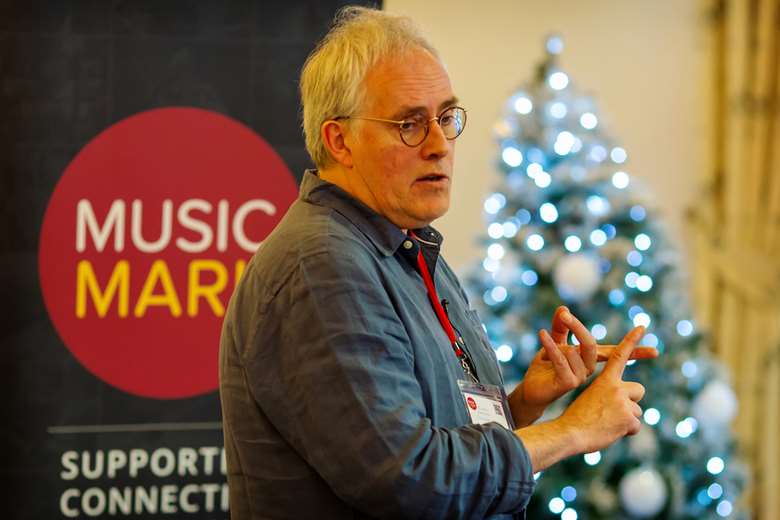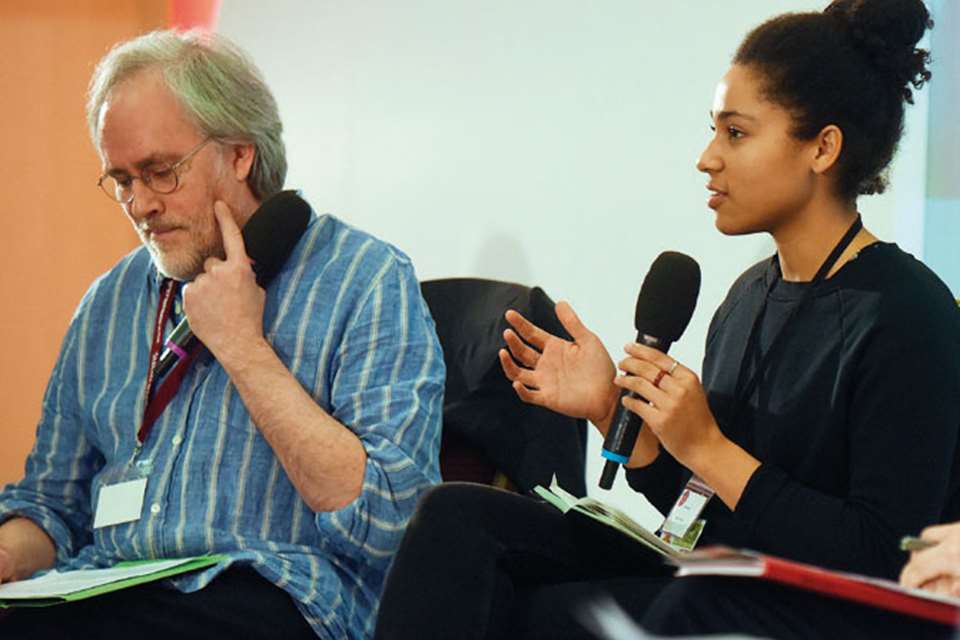Changing Tracks: The full value of instrumental music teaching
Michael Davidson
Thursday, June 1, 2023
Teacher and researcher Michael Davidson reports on his work with Hertfordshire Music Service and on inclusive practice.

Hertfordshire Music Service Changing Tracks project
Historically, instrumental music teaching has been valued narrowly. Teachers have been described as ‘instructors’, in ‘telling mode’, preparing children for performances in examinations. High-quality teaching has been defined as progressing pupils through grades and formal ensembles to the tip of a ‘pyramid of opportunities’ to join conservatoires. My research as a practising teacher and development officer has found that focusing on a wider range of outcomes can demonstrate the full value of instrumental music teaching, at a time when music is at increasing risk of marginalisation in schools.
Broader participation
This research has been supported by a succession of grants from Youth Music, which funds music-making for children with barriers to participation. Youth Music employs an outcomes approach – ‘deciding the change you want to bring about, and then working out how to make this happen’ – and focuses on personal and social as well as musical outcomes. This approach has previously been more associated with community music than instrumental teaching.
From 2003, Hertfordshire Music Service invested in developing an informal music team to broaden participation. Employing local professional musicians who had progressed to commercial success after learning informally helped to develop a more creative approach than the conservatoire ecosystem which then characterised music services. From 2008 to ’10, Youth Music funded a rap project which engaged pupils in Youth Clubs and Pupil Referral Units, broadening outcomes, as well as participation. From 2010 to ‘12, Songwriter 2012 explored how creative musicking could improve outcomes for vulnerable children; working with SENCOs helped to offer this to targeted groups of young people in secondary schools. From 2015, my PhD research ‘Citizens of Here’ explored how bringing together instrumental music teaching, community musicians and SENCOs could help to develop a broader type of instrumental music teaching, which might prevent the school exclusion of children in challenging circumstances.
Changing Tracks
From 2018 to ‘23 I was lead teacher/researcher on Changing Tracks, a strategic Youth Music action research partnership hosted by Hertfordshire Music Service, which sought to develop this outcomes-based approach throughout music services nationally. In partnership with Music Mark, Changing Tracks developed peer working-groups of service heads and inclusion managers, exploring a research question of ‘what are the challenges, enablers and benefits of embedding musical inclusion within music services?’ We found that when music services begin working on inclusion, we often begin by seeking to remove barriers that prevent young people from joining in with what we already do. This is important, but we learn more from targeting work to the needs and interests of children in challenging circumstances. Changing Tracks began by encouraging partners to develop timebound targeted projects, with the aim of embedding this more throughout music services, to offer a more equitable music education that can benefit all.
Changing Tracks sought to improve personal, social and music outcomes from young people in challenging circumstances. It aimed to do this strategically by making inclusive practice more visible and better understood within music services, and by training the instrumental music teaching workforce to adapt its teaching to the needs and interests of a wider range of young people.
Changing Tracks found that music services often assume that an instrumental music teacher’s approach can be a barrier to developing targeted inclusion work. Many reproduce the pedagogy of their own teachers, focusing more on musical than personal and social outcomes. Targeted inclusion work is often delivered by community musicians, who work and train separately from instrumental music teachers. However, many music service teachers are very interested in inclusion.
From research to training
A musical nurture group model initiated by a Hertfordshire First Access/WCET tutor offered a way to embed targeted musical inclusion practice within mainstream primary schools. Changing Tracks built on this to develop a training which could develop mainstream instrumental music teachers’ practice to prevent exclusion from an early age. A trauma-informed session described how music can heal the effects of dysregulated nervous systems which may prevent children settling into school, socialising and learning. Community music activities focusing on improvisation and composition offered practical activity ideas for how to adapt practice. However, creating a space where diverse groups of community musicians, instrumental and curriculum teachers felt comfortable to share the challenges and successes of their sessions proved the most helpful training for many. Moving activities online during the pandemic enabled Changing Tracks to train teachers from 32 music services in how to develop inclusive practice.
Teachers worked with 3-5 pupils for 30 minutes weekly. As previously, opening conversations with SENCOs proved key to helping teachers to adapt their practice to the differing needs and interests of children in challenging circumstances they hadn’t previously focused on. The training drew also on an outcomes framework based on learning from my PhD, that children who become excluded often have restricted agency, or a lack of freedom as a result of emotional difficulties and institutional inflexibility. We invited teachers to focus on how to encourage pupils’ agency, resilience, reflection and social interaction through the music-making, rather than seeing these as a ‘by-product’ of musical learning.
New focus
For many, this involved focusing more on process rather than musical outcomes; listening more than telling pupils what to do; and encouraging pupils to choose material or to co-create rather than perform repertoire determined by teachers. Improvisation helped to free pupils from fear of failure and flowed into composition and song-writing activities. The community musicians also suggested how encouraging pupils to create names for their bands encourages more ownership and greater engagement.
For some of the curriculum teachers, adapting their practice meant learning to watch and facilitate the pupils’ interaction rather than seeking to impose structure, which often proved counter-productive. We spoke a lot about the need to let the children wait until they were ready to participate, even if this might appear to an observer that they were not engaged. Many commented on how much they enjoyed being free to focus on the process, creativity and social outcomes of the community music approach. But we also agreed that there was no one way of doing things: it was more important for teachers to explore how to adapt their own practice rather than adopt ‘one size fits all’. Some teachers found that looking for broader outcomes from curriculum repertoire also proved successful.
Monitoring
The teachers kept reflection diaries to help them write reports for each pupil, and wrote case studies about individual pupil or group development, which they rehearsed through discussion in reflection sessions. These were analysed by inclusion project managers to assess how far outcomes had been met, as a way of embedding understanding of inclusion practice within the wider services.
Impact
Many teachers commented that they felt the project had improved their teaching, by helping them understand and adapt their practice to the needs of SEND pupils in their WCET practice. Many reported that being part of a research project focused on social impact had raised their profile within both their schools and their music services and that this had enhanced their professional identity.
We learnt also about how to use the music to talk about emotion indirectly, rather than opening up topics which might disturb vulnerable pupils. And we learnt that while the value of performing to others has been contested by some community musicians, rising to this challenge helped some children to develop resilience. But for many teachers, a key outcome was how making music together helped to develop the children’s relationships and to form musical communities which benefited pupils’ social confidence beyond sessions.
Potential for partners
Thirty-two services took part in the creative musical nurture group project, which coincided with a considerable interest in pupil wellbeing and school inclusion from the many local authorities which host music services. Some partners sourced considerable match-funding to roll out the work more widely, as a way to encourage the social inclusion of vulnerable young people through music. In some cases, the work helped services to develop work with schools they had not engaged previously, demonstrating the business as well as ethical value of inclusion.
In its final two years, Changing Tracks explored the wider structural changes needed to embed this approach more widely as part of services’ regular offer to schools, rather than a timebound project. Working groups developed an inclusive job description to help recruit a wider range of staff and a lesson observation framework that together position inclusive processes and outcomes as a key element of high-quality teaching. Partners were interested to develop similar creative approaches in their WCET training, to have more capacity and for work to become sustainable.
Although still in its infancy, this work has demonstrated effective ways to embed inclusive practice within the music service instrumental teaching workforce. And with the new National Plan’s focus on broader values for music education and in particular on creative progression pathways, it has much to offer music services interested to demonstrate the full value of instrumental music teaching.
hertsmusicservice.org.uk/schools-area/changing-tracks
musicmark.org.uk/resources/providers/changing-tracks
michael@citizensofhere.com


